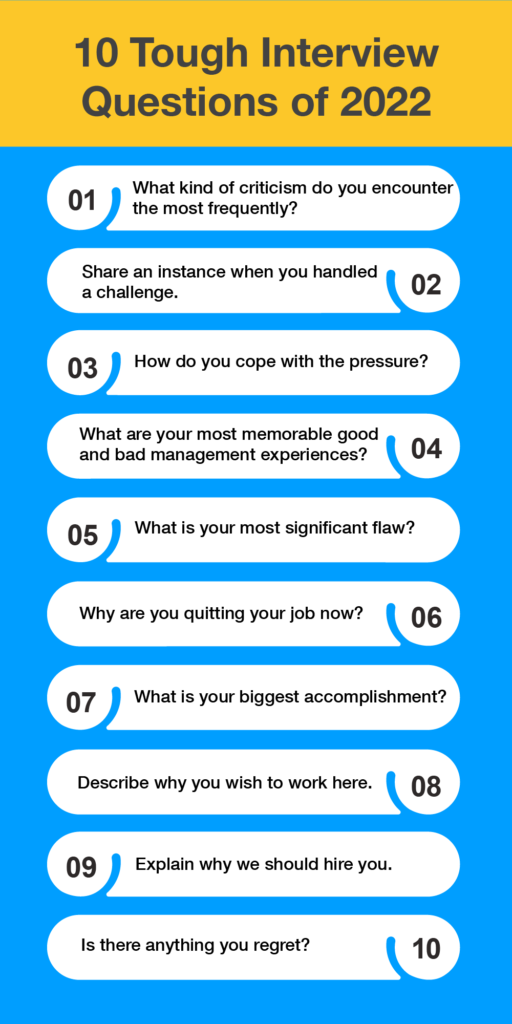Interview Questions and Answers for Freshers and Experienced - In a job interview, you can be given questions requiring more in-depth responses. Industry-specific tough interview questions may differ significantly, but there are a few challenging questions that employers frequently use to find out more about the candidates.

In this post, we on Dr. Job look at several instances of challenging Interview Questions and Answers for Freshers and Experienced.

1. What kind of criticism do you encounter the most frequently?

Read also, 15 Microsoft Word Interview Questions And Their Answers
Give a concise description of the criticism and how you plan to address it.
Example: "While I enjoy working with others and getting enthused about the projects I'm working on, I also fully appreciate the need to listen and actively use the various ideas present. I've heard that I sometimes talk over other people in meetings. When others are sharing, I make it a point to carefully listen while taking notes, and I wait until the very end to speak."
2. Share an instance when you handled a challenge.

Provide a concise overview of the circumstances, your role in them, the activities you took to resolve the problem, and the outcomes of your actions.
Example: "During wedding season, I worked as a store assistant at a clothes shop. A client ordered a dress online and delivered it to the store, where another customer unintentionally bought it. I found the same outfit at another shop nearby before calling the initial buyer. I brought it to her house along with a gift card to say thanks for her patience. The client gave us a five-star review right away on many review websites.
3. How do you cope with the pressure?

Example: "Communication is essential for me in stressful times, even if it means going above and beyond to ensure everyone is on the same page. As an illustration, when I was working on a project with another team, we discovered duplicated work being done. We accelerated the project and significantly aided in achieving a critical company goal by organizing a weekly meeting and maintaining open channels of honest communication with our teams and supervisors."
4. What are your most memorable good and bad management experiences?

They might use this information to determine whether or not you would work well with their management. That is a question that you should honestly and diplomatically answer.
Example: "While incredibly talented, one of my former supervisors tended to tightly supervise our team's work while leaving little room for creative problem-solving. I thought there wasn't much room for growth and that I wasn't trusted. My most recent manager did a great job of understanding my needs and assisting me in obtaining the tools I required to succeed. I do best when my bosses foster a culture of teamwork and trust.
5. What is your most significant flaw?

Example: "I recognize how vital it is to give comments on work or assignments that could have been handled more effectively. I've been working on improving one of my weaknesses: my capacity to offer helpful feedback. I'm writing down my criticism before speaking with my colleagues to help us fix this. That enables me to prepare my response beforehand, provide the best criticism, and feel less anxious."
6. Why are you quitting your job now?

They can use it to determine whether the position will be a better fit for you, make sure they can fill any gaps left by your prior employer, or decide whether or not you may have contributed to a bad experience for both of you.
Answer truthfully, but avoid revealing too much unpleasant or personal information.
Example: "While I much enjoyed my time at my former employer, there are now few prospects for growth consistent with my professional objectives. This role dramatically fits my skill set and professional advancement goals.
7. What is your biggest accomplishment?

Consider a current instance that is preferably connected to the position while answering. Briefly describe the accomplishment, your contribution, and why it is essential to you.
Example: "Last year, my team received the most creative process improvement recognition. My responsibility was to set up the group so we could develop ideas to expedite the production process. Three tried-and-true methods were examined, and we chose the one that produced the best results. We doubled our output because the process adjustment cut down on the time it took to produce goods by 20%."
8. Describe why you wish to work here.

This query can be especially significant if you're switching sectors or work roles.
Example: " When I began looking for a new job, I mainly looked for firms that value strategic planning, compassion, and honesty, and your firm is at the top of the list. I'm searching for a position where I can apply my enthusiasm for fantastic user experience since your company has always been forward-thinking and employed technology to improve the customer experience.
9. Explain why we should hire you.

To understand the essential qualifications, properly study the job description in advance.
In your response, describe how your background, abilities, and qualities make you the greatest candidate for the position.
For instance: "My commitment to the organization and my demonstrated organizational skills are reasons you should hire me. In my previous work as an administrative assistant, I established a system for categorizing the office supply cupboard. We placed fewer purchases and spent 30% less on office supplies than the previous year because products were simpler to find. I can't wait to apply my abilities in this position."
10. Is there anything you regret?

Tell them that even if you've made mistakes before, you've used them to improve.
If not, you may pick a professional shame or flaw that wouldn't interfere with your ability to do your job.
Example: " I usually wish I had known what I wanted to do earlier in my career. I would become even better at my career if I had more time to develop and advance. However, I gained knowledge and abilities from my prior employment that I would not have otherwise acquired, helping me in my current position."
In conclusion, we hope the previous Interview Questions and Answers for Freshers and Experienced that it helps you get your dream job!








 2023-05-04
2023-05-04
 2023-05-03
2023-05-03
 2023-04-26
2023-04-26
 2023-04-17
2023-04-17
 2022-12-09
2022-12-09
